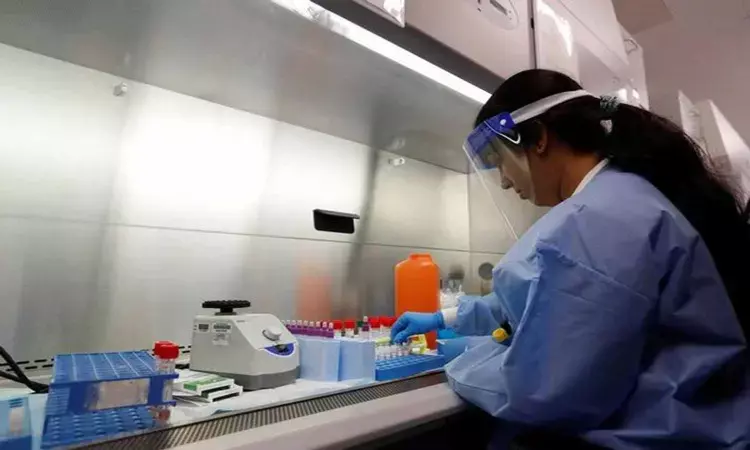- Home
- Medical news & Guidelines
- Anesthesiology
- Cardiology and CTVS
- Critical Care
- Dentistry
- Dermatology
- Diabetes and Endocrinology
- ENT
- Gastroenterology
- Medicine
- Nephrology
- Neurology
- Obstretics-Gynaecology
- Oncology
- Ophthalmology
- Orthopaedics
- Pediatrics-Neonatology
- Psychiatry
- Pulmonology
- Radiology
- Surgery
- Urology
- Laboratory Medicine
- Diet
- Nursing
- Paramedical
- Physiotherapy
- Health news
- Fact Check
- Bone Health Fact Check
- Brain Health Fact Check
- Cancer Related Fact Check
- Child Care Fact Check
- Dental and oral health fact check
- Diabetes and metabolic health fact check
- Diet and Nutrition Fact Check
- Eye and ENT Care Fact Check
- Fitness fact check
- Gut health fact check
- Heart health fact check
- Kidney health fact check
- Medical education fact check
- Men's health fact check
- Respiratory fact check
- Skin and hair care fact check
- Vaccine and Immunization fact check
- Women's health fact check
- AYUSH
- State News
- Andaman and Nicobar Islands
- Andhra Pradesh
- Arunachal Pradesh
- Assam
- Bihar
- Chandigarh
- Chattisgarh
- Dadra and Nagar Haveli
- Daman and Diu
- Delhi
- Goa
- Gujarat
- Haryana
- Himachal Pradesh
- Jammu & Kashmir
- Jharkhand
- Karnataka
- Kerala
- Ladakh
- Lakshadweep
- Madhya Pradesh
- Maharashtra
- Manipur
- Meghalaya
- Mizoram
- Nagaland
- Odisha
- Puducherry
- Punjab
- Rajasthan
- Sikkim
- Tamil Nadu
- Telangana
- Tripura
- Uttar Pradesh
- Uttrakhand
- West Bengal
- Medical Education
- Industry
Identifying life threatening bleeding using iCoaglab

Increased risk of organ failure and death in hospitalized patients may occur due to Delayed identification of coagulopathy and bleeding. Improved outcomes for patients can be provided by Timely and accurate identification of impaired coagulation at the point-of-care. This can identify the bleeding risk and guide resuscitation as well.
A team led by investigators at Massachusetts General Hospital has developed a novel, inexpensive and portable device that can quickly and accurately measure the ability of blood to properly clot (or coagulate).
The novel and innovative device called iCoaglab has developed which has the capability to identify patients with elevated risk for bleeding. The device is extremely effective in identifying bleeding risks and preventing hemorrhage, a study published in the journal Thrombosis and Haemostasis, 2020, has found
iCoagLab is a novel and innovative device which is used for comprehensive whole blood coagulation profiling.
In the study, the researchers tested the accuracy of a novel optical coagulation sensing approach and investigated its diagnostic accuracy in identifying patients at elevated bleeding risk.
Nearly 270 Whole blood samples collected from patients undergoing conventional coagulation testing were measured using the iCoagLab device. Re calcified and kaolin-activated blood samples were loaded in disposable cartridges. Using these samples, time-varying intensity fluctuation of laser speckle patterns were measured to quantify the clot viscoelastic modulus during coagulation.
Coagulation parameters including the reaction time (R), clot progression time (K), clot progression rate (α), and maximum clot strength (MA) were derived from clot viscoelasticity traces. These were compared with mechanical thromboelastography (TEG).
From the study the researchers found the following:
• In all patients, a good correlation between iCoagLab- and TEG-derived parameters was observed (p < 0.001).
• Multivariate analysis showed that iCoagLab-derived parameters identified bleeding risk with sensitivity (94%) identical to, and diagnostic accuracy (89%) higher than TEG (87%).
• The diagnostic specificity of iCoagLab (77%) was significantly higher than TEG (69%).
The researchers concluded that By rapidly and comprehensively permitting blood coagulation profiling the iCoagLab innovation is likely to advance the capability to identify patients with elevated risk for bleeding, with the ultimate goal of preventing life-threatening hemorrhage.
"Clinicians in the operating room or the ICU often walk a thin line to maintain the delicate balance between bleeding and coagulation," said senior author Seemantini K. Nadkarni, PhD, an associate professor at Harvard Medical School and director of the Nadkarni Laboratory for Optical Micromechanics and Imaging at the Wellman Center for Photomedicine at Mass General.
"The iCoagLab innovation will likely advance clinical capability to rapidly identify patients with defective clotting at the point-of-care, assess risk of hemorrhage, and tailor treatments based on individual coagulation deficits to help prevent life-threatening bleeding in patients."
To further read about the study, click the following link:
http://dx.doi.org/10.1055/s-0040-1712956
BDS, MDS
Dr.Niharika Harsha B (BDS,MDS) completed her BDS from Govt Dental College, Hyderabad and MDS from Dr.NTR University of health sciences(Now Kaloji Rao University). She has 4 years of private dental practice and worked for 2 years as Consultant Oral Radiologist at a Dental Imaging Centre in Hyderabad. She worked as Research Assistant and scientific writer in the development of Oral Anti cancer screening device with her seniors. She has a deep intriguing wish in writing highly engaging, captivating and informative medical content for a wider audience. She can be contacted at editorial@medicaldialogues.in.
Dr Kamal Kant Kohli-MBBS, DTCD- a chest specialist with more than 30 years of practice and a flair for writing clinical articles, Dr Kamal Kant Kohli joined Medical Dialogues as a Chief Editor of Medical News. Besides writing articles, as an editor, he proofreads and verifies all the medical content published on Medical Dialogues including those coming from journals, studies,medical conferences,guidelines etc. Email: drkohli@medicaldialogues.in. Contact no. 011-43720751


